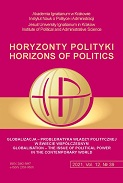Od chrześcijańskiego racjonalizmu do racjonalistycznego ateizmu - francuska myśl oświeceniowa
From Christian Rationalism to Rationalist Atheism. "Antyreligijne Koncepcje We Francuskiej Filozofii Podziemnej"
Author(s): Anna BudzanowskaSubject(s): Christian Theology and Religion, Political history, Early Modern Philosophy, 18th Century
Published by: Uniwersytet Ignatianum w Krakowie
Keywords: philosophie clandestine; radical enlightenment in France; rational atheism; N. Fréret; J.L. de Burigny; Du Marsais;
Summary/Abstract: RESEARCH OBJECTIVE: The objective of the article is to prove that the anti-Christian libertine theories present in the French underground philosophy of the XVIII century (philosophie clandestins), the secret philosophers associated with the academy environment: Académie des Sciences, Académie française, and especially the Académie des Inscriptions et Belles Lettres (so called.The Small Academy) influenced the formation of the idea of secularism proposed by ideological fathers of the Revolution of 1789 for post-revolution France. THE RESEARCH PROBLEM AND METHODS: The main research problem under consideration is the approach of the French secret philosophers to the issue of religion and faith that is not associated with political reflection but related to the literary world of the era, written on the pages of manuscrits philosophiques clandestins. Social and humanities specific research methods were used, including critical analysis, comparative research and methodology of literature theory. THE PROCESS OF ARGUMENTATION: The article is based on the contents of secret manuscripts in particular: N. Fréret, J.L. de Burigny and Du Marsais. It articulates visible traces of the transition from Christian ration alism, the leading thought of the period of enlightened absolutism in France, to the concept of rationalist atheism that became the signature of the the French Enlightenment and the post revolution era. RESEARCH RESULTS: The secret philosophers associated with the literary world, but not with political or legal reflection, questioned the thesis of the existence of God by treating religions as ethical systems for controlling social attitudes. The harmless thoughts of scientific observation, translated into the legal and political sphere, constituted the ideological core raised for the banners of the Revolution of 1789, which were then enshrined in the doctrine of secularism of the post revolutionary era of the French republican concept. CONCLUSIONS, INNOVATIONS, RECOMMENDATIONS: Studies of recent decades have also shown that there was a relationship between eighteenth century academicians and the heterodonistic and atyreligious, libertical thought circulating in the underground through of philosophical manuscripts. This phenomenon is parallel to the official public research activities of academicians from various fields: including literature or science, which has become an important part of the self determination of the era, especially in France and to what happened there with regard to the processes of secularization after 1789.
Journal: Horyzonty Polityki
- Issue Year: 12/2021
- Issue No: 39
- Page Range: 143-155
- Page Count: 13
- Language: Polish

